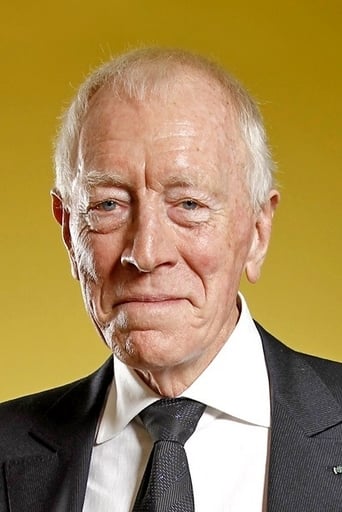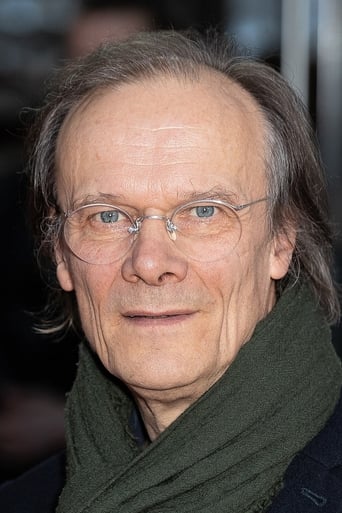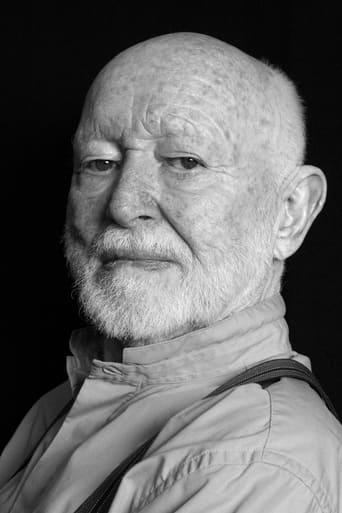Glucedee
It's hard to see any effort in the film. There's no comedy to speak of, no real drama and, worst of all.
TaryBiggBall
It was OK. I don't see why everyone loves it so much. It wasn't very smart or deep or well-directed.
filippaberry84
I think this is a new genre that they're all sort of working their way through it and haven't got all the kinks worked out yet but it's a genre that works for me.
Turfseer
Knut Hamsun seemingly had everything: Norway's poet laureate and novelist par excellence who won the Nobel Prize for Literature in 1920. So how did this "great man" end up by betraying his country by supporting Hitler during World War II? Hamsun was no garden variety traitor and the story of his collaboration is complicated as was made clear by Jan Troell's absorbing but somewhat biased 1997 film.The story begins in Norway at the time of Germany's surrender. We then flash back to 1936 at the time when Hamsun (brilliantly played by Max Von Sydow) was already 77 years old. He and his much younger second wife, Marie, can't stand each other and his four adult children resent their father for sending them off to boarding school when they were young and basically not expressing enough affection toward them when they were growing up.Flash forward to 1940 and Hamsun openly calls for Norweigians not to resist the new Nazi occupiers but to cooperate with them. He supports Quisling, the puppet head of the newly installed Fascist government and is further resented by the general Norwegian population when Marie (who speaks German) goes on the lecture circuit, supporting the German cause.Despite his pro-German leanings, Hamsun attempted to intervene on behalf on resisters scheduled to be executed by the Nazis. Hamsun met with Josef Terboven, the Reich Commissioner in Norway, but his appeals for mercy fell on deaf ears despite Terboven's soon to be realized false assurances. Hamsun rejected Nazi racial theories to Terboven's face and had Jewish friends. Hamsun even met with Hitler in Germany in 1943 (as most ably illustrated in the film) and alienated the cruel dictator by protesting Terboven's brutal policies in Norway. Upon leaving, Hitler was overheard remarking that he never wanted to see "that man" (Hamsun), ever again! Hamsun was quoted as saying that he still believed in Hitler but his "wishes were being twisted" by men like Terboven (this according to Jeffrey Frank in his excellent 2005 article in the New Yorker, "In From the Cold-The return of Knut Hamsun").After the war Norway hardly was in a position to dispose of Hamsun as they did Quisling, who ended up in front of a firing squad. Hamsun, on the other hand, was an old man. His wife got three years in prison but Hamsun ended up being shuttled back and forth between a nursing home and a psychiatric institution. Hamsun resented being diagnosed as "senile" by the psychiatrists and demanded his proper day in court. Finally a civil action was brought against him and he was fined a substantial portion of his savings.In his defense, Hamsun argued that due to his advanced age, deafness and isolation (he only had pro-German papers to read on his country estate), he was unaware of the atrocities the Nazis were committing. This same view appears to have been endorsed by Troell, who appears to have been influenced by the author of a book chronicling Hamsun's trial as well as a 1987 biography (according to Jeffrey Frank). Troell only briefly touches on Hamsun's support of Germany during the war. Much of the support stemmed from Hamsun's anti-British attitude which dated back to the Boer War in 1900. In Hamsun's myopic world view, Britain was the devil incarnate, citing the excesses in its years as a colonial power. Hamsun could never admit that Britain had evolved much since those days and had a become a progressive force in world politics. Troell appears to argue that Hamsun found some measure of redemption in his last years, writing a new book after so many years, in an attempt to justify his behavior.The bottom line is that Hamsun never was able to see the bigger picture. During the occupation of Norway during World War II, Hamsun was unable to draw the connection between the Reich Commissioner's brutal policies and Hitler himself. Somehow Hitler was not aware and not responsible for what his subordinates were doing in Hamsun's eyes. Hamsun saw Norway as independent but part of a greater German Empire, with Great Britain as victimizer, not victim.Hamsun is an excellent portrait of the curmudgeonly artist who turned a blind eye to what was going on in the world before the tragic occupation of his country. He had ample opportunity to observe what the Nazis were all about between the wars but chose to view the world only through an anti-British prism. Hamsun's failure was probably most due to a rigid personality that could see or hear no evil.
Terrell-4
There are two excellent reasons to watch this film. First, to observe the artist as obliviously self-involved, a figure of genius at what his talent enables him to accomplish and, at the same time, something of a monster in believing his talent justifies his unshakably selfish behavior and naive, misguided beliefs. Second, to see yet another magnificent portrayal by Max von Sydow. I think a case can be made that von Sydow has emerged as the greatest film actor of the last fifty years. Knut Hamsun is one of the great writers of Western culture. He was born in 1859 in Norway, achieved a towering reputation as a novelist and poet, was awarded the Nobel prize for literature in 1920 and forever will have an asterisk by his name. The asterisk? Knut Hamsun* passionately supported the rise of Nazism, believed to the end that Hitler was a great man and supported the Nazi occupation of Norway. Hamsun believed in agrarian values and hated modern industrial culture. He hated the British. He believed Germans and Norwegians were one people and that Norway would sit at the table next to Germany in bringing true values to the lives of all people. The movie starts in 1935 when Hamsun was 76. His marriage to Marie, a former actress 22 years younger, mother of their children, is almost poisonous yet interdependent. "You've made me ugly," she screams at him. "Yes, we've made each other ugly," he says contemptuously and turns away. Everything -- marriage, children, time -- revolve around his needs as a great writer and intellectual. For Hamsun, the rise of Hitler and Nazism promised an age of an orderly flowering of all he believed in. In brief, he swallowed what Hitler was saying, believing what he wanted to believe and unable to question his own certitude. His wife was even more fervently pro-German. Hamsun supported the Quisling government, argued against young Norwegians joining the resistance and denounced the Western allies and the Bolsheviks. Yet at the same time he would intercede in attempts to save those scheduled for execution. He believed in the goals of Nazism, just not all the means. He had never read Mein Kampf and was genuinely shocked after the war when he was forced to watched news reels of the death camps and the slaughter of Jews and all the others. He held to his beliefs even to the end. When Hitler committed suicide, Hamsun insisted on writing an obituary which was published in a Norway about to be taken over by the Allies. "Far be it from me," he wrote, "to talk vocally about Adolph Hitler. Neither his life or deeds invite any sentimentalism. He was a warrior, a warrior for mankind. He preached the gospel that all countries had rights. He was a reformer of the first water. It was his historic destiny to work in a time of extreme brutality which eventually destroyed him. That is how Western Europe should look upon Adolf Hitler. And we, his closest supporters, bow our heads over his death." After the war Hamsun was arrested for treason, but held in a psychiatric hospital. Although most Norwegians now detested him, the government wasn't about to have an 86-year-old Nobel prize winner stood against a wall and shot. He was forced to undergo a lengthy psychiatric examination. Eventually the government decided he was "permanently mentally disabled," fined a substantial amount of money and released. How mentally disabled was he? He later published a scathing memoir. Feeble and full of years, he died at 92. That asterisk will always be attached to his name. Let artists who believe their genius entitles them to evaluate real life as it effects others beware. Max von Sydow gives an indelible portrait of this brilliant, selfish, complex, tremulous, naive, self-centered and unshakable old man. He shows us the man from 76 to 92 and seems to shrink before our eyes. With a quivering hand and an old man's cough he becomes Hamsun. The performance is powerful and full of nuance: Hamsun and his wife (played by the wonderful Danish actress Ghita Norby) shredding each other with her reproaches and resentments and his ugly certitude; Hamsun trying to escape from a woman pleading with him to intercede for her imprisoned son; Hamsun trying to make his case with Hitler and becoming carried away with his own uncontrollable flow of words and more words; Hamsun dealing with a crafty psychiatrist; Hamsun testifying for himself after the war before a panel of judges...not justifying himself, not denying what he wrote, but still insisting that nothing he did was wrong...that he didn't kill anyone, that no one told him what he was writing was wrong, that Hitler was shown to be bad but, after all, that is in the past and cannot be undone. I can think of few actors, perhaps none, who have been vital to so many powerful films over so long a period. Just consider a few: The Seventh Seal (1957), Wild Strawberries (1957), The Virgin Spring (1960), The Immigrants (1971), The New Land (1972), Pelle the Conqueror (1987) and Hamsun (1996). Even in the many movies in Europe and America he has made primarily, I assume, for the money, he has never failed to give less than a believable and vivid performance. Among my favorites: The incredibly over-the-top and amusing Ming the Magnificent in Flash Gordon (1980), the wise and thoughtful paid assassin, Joubert, in Three Days of the Condor (1975) and the sincere and doomed Dr. Paul Novotny in Dreamscape (1984). von Sydow's performance as Knut Hamsun is one of his richest and most subtle roles to date.
arcticwater
One of the elements that make this film one of the most fascinating ever made is the use of language... while Knut and Marie Hamsun were Norwegians, Max von Sydow and Ghita Nørby speak Swedish and Danish respectively throughout the movie. To those not well-versed in Scandinavian languages, there is a very big difference. Most Swedes cannot understand more than 20% of spoken Danish and perhaps 60% of Norwegian. To make the comparison easier to grasp, imagine a Spanish movie where the main characters speak Portuguese and Italian. I don't know why this linguistic device was used, but the effect is remarkable. At first I figured it was a way to distance Norwegians from the main characters whom were regarded as traitors, but that theory doesn't hold since the character who plays Quisling (the man who "sold" Nazism to many Norwegians) speaks Norwegian throughout the film.Trivia: throughout Scandinavia the name "Quisling" is not just synonymous with "back-stabber"... it has actually become a commonplace word and is found in most dictionaries. It is comparative to the phrase "his name is Mudd" in the U.S.
i_like_music
First of all I'd like to say that this movie was more exciting than I would have thought it to be in the start. Which is always a plus. In the beginning it was odd to me that Knut Hamsun were played by a Swedish actor and his wife Marie Hamsun were played by a Danish actor. But to tell you the truth, after a while you hardly noticed the language difference. And they could probably not have found a better Knut and Marie for this movie. The movie starts right before the second world war, and the 'action' in it is mostly about the Hamsun family's life during the second world war and afterwards. It was kind sad that the movie started so late in Hamsun's life, seeing that he was around the age of 80 (?) in the war years. Because Knut Hamsun had an utterly exciting life before that, and the most of his writings were written before that. It was confusing to me who his kids were at times, seeing that they weren't introduced to us that well. This is a great movie about an Norwegian author who rather took side with the Germans during the second world war, since he despited the English. Or was he on the German side? this movie takes up this dilemma, which no one yet can be a 100% sure about. But just remember. This movie only takes the Last years of Knut Hamsun's life. You should know a few things about his life before this, if you want to understand the movie properly.






